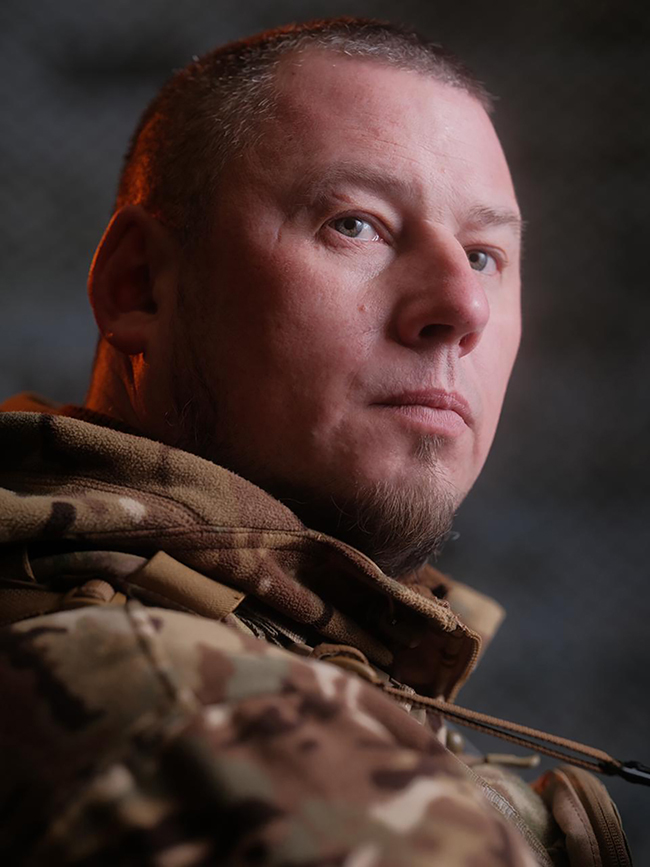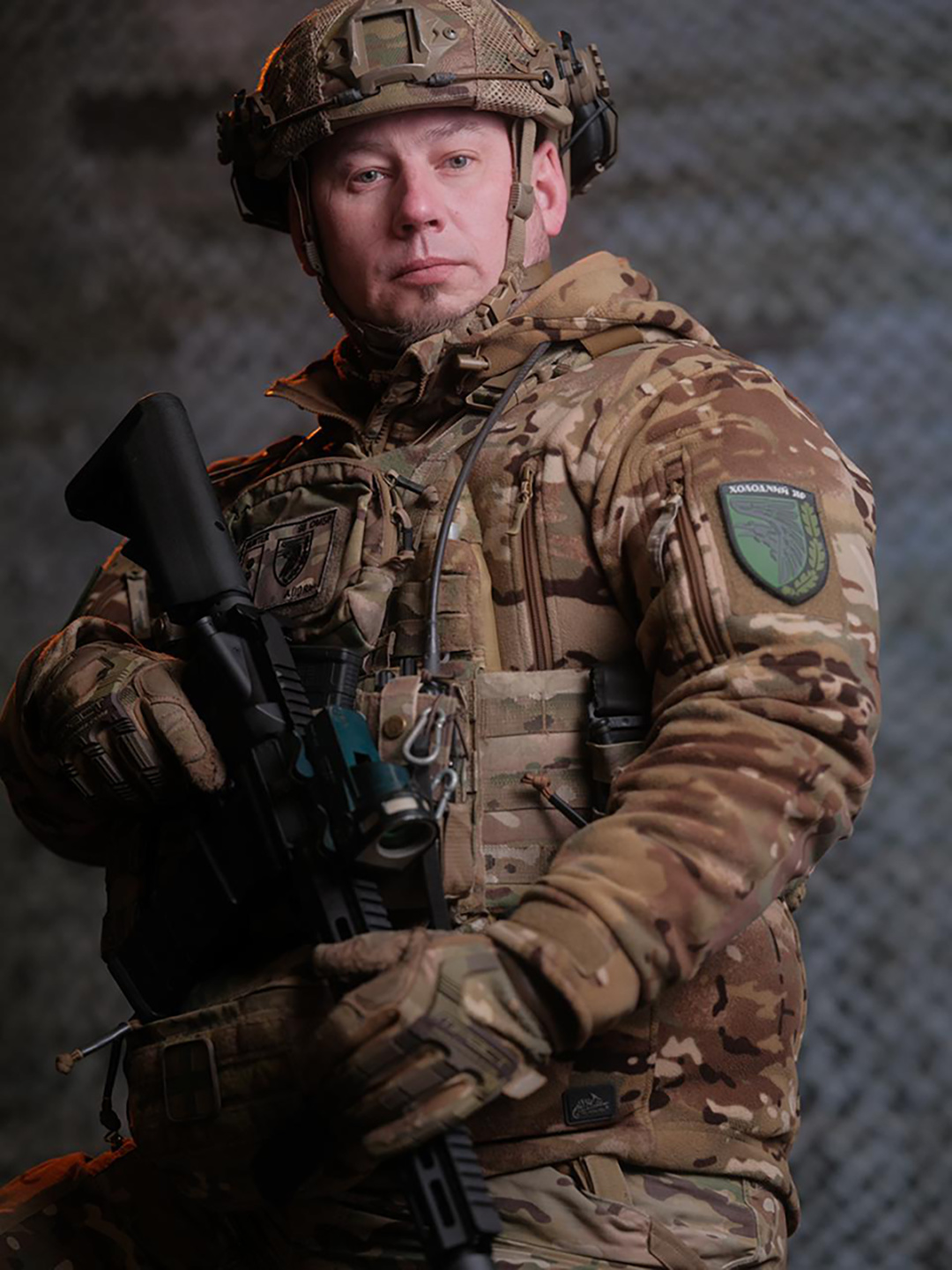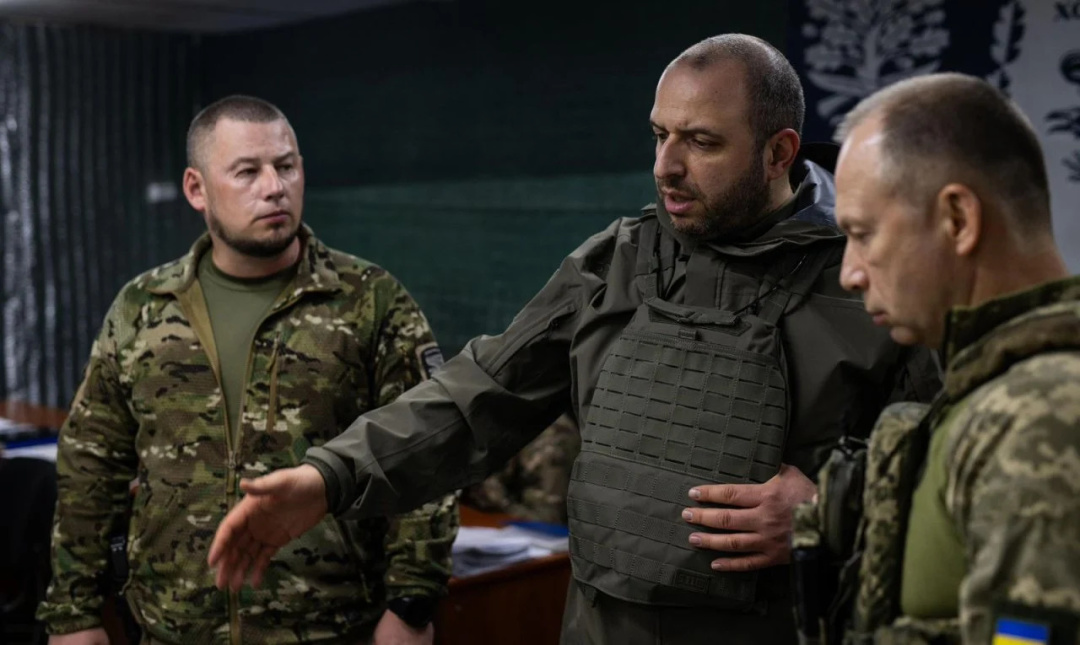There has been enough criticism of the military on social media these days. Sometimes this criticism is fair, but more often it is unjustifiably evil and, to put it mildly, biased. Meanwhile, this criticism is taken into account. There is already a sad joke in the army that some commanders are removed according to a post on Facebook... We are convinced that this is wrong and dangerous during such a war, especially because a generation of combat officers capable of leading the Ukrainian Armed Forces to victory over our mortal enemy has grown up during a ten-year war in Ukraine.
Today we are starting a new section called "Victory Commanders."
Colonel Palisa, the commander of the Kholodnyi Yar brigade, is now in a place where it is very hot (and this is not only about the heat). In view of the situation in the Donetsk region, we had to catch the brigade commander for several days for the sake of a short conversation. But it was worth waiting even a year. The 39-year-old commander with the call sign "Hunter," which he inherited from one of the commanders, is already a knight of the Order of Bohdan Khmelnytskyi, has a Cross of Combat Merit and ten years of experience in war. He says that one day he will write a whole book about the defense of Bakhmut... Always open with the soldiers, he respects his fellow officers and is always proud of his "Kholodnyr Yar." "Service in the army is not a debt, but a struggle for our future," "Hunter" said. At one time, he dreamed of being a soldier, he studied a lot and hard, and now he is doing his best and knows exactly what the future of Ukraine should be, for which so many of his comrades have given their lives.
FROM THE COLLECTOR OF LEAD-ALLOY SOLDIERS TO THE COMMANDER OF 'KHOLODNYI YAR'
- Mr. Colonel, when you entered the Lviv Institute of Ground Forces, what was your motivation? How did you then think about what you wanted? Why did you choose this profession?
- I was very lucky in this regard, because I dreamed of being a soldier all my life. My classmates even used to joke about me that I was born in a camouflage diaper.

- So you dreamed of feats? I don't know how it can be with the boys... war was not foreseen at that time, was it?
- I grew up in a military family. My father is a military man, already retired. We moved from place to place very often. I grew up in military towns where, you know, the very atmosphere is like this - the whole town lives the life of the unit. And I probably thought that there is simply no other way. I liked it. I believed that this was a man's job and that I would probably be able to bring the best benefit to my state in this direction. When all my friends had piles of cars, I had a collection of toy APCs, tanks, soldiers...
- It's clear. But when you later got to the United States to study (Palisa graduated from the U.S. Army Command and General Staff College at Fort Leavenworth, Kansas), did you notice any such fundamental difference between our military education and the American one? I know, for example, that for U.S. officers there is a list of historical and patriotic literature, which they are recommended to read, because it is important for the formation of an officer's personality, some qualities.
- After spending one year in the U.S., I do not consider myself competent enough to compare education systems. But in Ukraine, I completed the operational-tactical level. I obtained it at the Command and Staff Institute of the National Defense University, and comparing it with the college, these are completely different things, completely different accents. It would probably not be completely correct to compare them, but I can note what impressed me in America. First of all, a very well-thought-out approach, starting with the little things, with the construction of the program itself, continuing with the selection of cadets and the skills of the teaching staff. I was really impressed. The format itself was unusual for me – I spent a lot of time preparing for classes. For example, in a few days I get homework - what I have to read before the class starts and what I have to do. And already in the audience, the answers to the questions are not read out, but they are discussed: one's own vision, specific examples. Enormous attention is paid to the stimulation of critical thinking. I really liked when the director, in his introductory speech to the students at the beginning of the academic year, urged everyone to be proud that they became students of this college, and here they will be trained as brain rangers. This means constantly analyzing, assessing risks, looking for unusual approaches to ordinary problems.
The training was versatile, not limited to purely military disciplines. For example, we studied the experience of large corporations - how leadership qualities work in civil organizations, the involvement of basic knowledge in psychology. A lot of time and attention was given to communication skills so as to clearly set tasks for subordinates and provide explanations, and report the situation to your senior commander. How to convey the necessary information so that it takes less time and makes more sense. It was extremely cool.
I had to read a lot. In fact, it was difficult to study there, I thought more than once – it's a nightmare, why did you need it? It often happened that after spending the night reading literature and doing homework, I closed my laptop in the morning, drank coffee, packed my backpack and went to classes.
- But you don't regret this experience, as far as I understand?
- I don't regret it. It was extremely useful. Both in terms of military affairs and life experience.
- Now there is a lot of talk about the fact that we still have Soviet-style officers and there is already a new generation. In your opinion, what should a modern commander be like - I don't know, maybe a "NATO model" commander – the one who meets the needs of the time?
- I think that the needs and requirements for an officer are always the same - the question is in the methodology of his work, the skills he must have. In my opinion, above all, an officer must be a competent leader in his position. I know excellent, let's say, company commanders - just men of steel, who were later appointed as battalion commanders, and that's it... They didn't get an intelligent battalion commander, but they lost a cool company commander. The company commander was the leader of his team, people followed him, he was prudent, intelligent, he knew all the combat capabilities of his unit and had an individual approach to people, etc. But it didn't work out to be a battalion commander. In such a case, it is better to have a cool company commander than say: "It's time for you to become a battalion commander, because time is running out." Time should not be crucial here.
An officer must have a balanced aggressiveness and willingness to take reasonable risks. This balanced aggressiveness must be cultivated during the training process at military institutes, during advanced training courses, and in the future. Why balanced aggressiveness? Because only this feature allows the commander to seize the initiative from the enemy during the battle. I could be wrong, but that's how it should be. And the officer must have intelligence and knowledge according to the position. Because no matter how much someone wants to grow and climb the career ladder, as I already said, it is better to be a steel company commander than a stupid battalion commander.
- What kind of commander are you? Demanding, humane, strict, moderately aggressive?
- This question is not for me - it should be addressed to my subordinates.
- Have you made any mistakes that you can now talk about calmly?
- I will not provide any examples. Of course, yes, I made mistakes. There are many things that I have already analyzed and, I think, will continue to analyze in the future. The most important thing is to draw the right conclusions from such things.

WHERE DO GOOD SOLDIERS AND BRIGADES 'WITH CHARACTER' COME FROM
- Let's talk about "Chasiv Yar." You often emphasize that this team has character. Where does it come from? What do you know about your fighters? How much are you involved in private, perhaps, circumstances, mood, problems, level of support?
- What should I start with? Okay, let's talk about character. The character of the team is like the character of a person: a certain set of individual qualities. What I noticed even when I did not serve in the 93rd brigade (I think people who have encountered the 93rd brigade will also agree) - that the brigade is characterized by resilience, endurance and perseverance. Soldiers in the army are a section of society and we have people from all regions of Ukraine and different age categories. The history of the brigade itself can convincingly tell about the character of the unit and its fighters. Since 2014, it has visited the hottest points of the front: Donetsk airport, Avdiivka, Pisky... Later, during the full-scale invasion – the brigade participated in the liberation of the Sumy region, the Izium operation, the battles for Soledar, the Bakhmut defensive operation, where the 93rd brigade was the headliner of the city's defense. And the current area where the brigade is working is also characterized by high intensity. The fighters are holding on. This is no longer the same composition that was (mostly contract workers) at the beginning of the full-scale invasion. But resilience has remained, mobilized fighters and those who signed a contract through recruiting are joining the team. The skeleton that remained is passing on its experience, its knowledge, its skills and a piece of that spirit... I understand that resources are not limitless and the brigade needs time, a lot of time, for full recovery. But the fighters are doing titanic work - both commanders and sergeants, these are people of steel will. Every day they have to solve a huge range of problems: how to carry out a replacement at the positions (the main problem is to get there unnoticed), where to find Mavic drones for the unit, and they also have to write off lost property, organize the delivery of ammunition, radio stations, water, and dry rations to the positions. Someone in the company or platoon urgently needs something - family leave, car repair - five hundred million problems to be solved. And with all this, you have to manage the battle, conduct reconnaissance within your limits, take care of training, and provide combat training classes. That is, a colossal burden falls on people, but it is precisely because of all this that the brigade earns resilience and endurance. Although I perfectly understand that human resources are primarily internal, I am not talking about the number of personnel - they are not unlimited. I would really hate to allow people to burn out when the initiative disappears.
- I tried to understand to what extent the brigade commander could be aware of the affairs of specific soldiers. Relatively speaking, does he know half of the brigade by name...
- Unfortunately, I cannot boast of this. In the current conditions, it seems to me that it is almost not realistic.
- Do you have any orientation in military matters? Viktor Muzhenko sometimes quotes Sun Tzu, Zaluzhnyi is associated with "Star Wars" because of Baby Yoda... Maybe you are referring to the memoirs of some general or Chinese stratagems?
- It's all interesting to me, and before I got to the United States, I thought that my hobby was reading. But I had to read so much there that I thought I would never pick up a book again. Hopefully, someday in the future, I will have time for a hobby. I like to read historical books, about various outstanding personalities, in particular.

About 15 years ago, I found an interesting phrase in one book (it has absolutely nothing to do with military matters): every soldier should dream of becoming a general, but not to actually become one, but to be a good soldier. And it helped me a lot during my studies and even now supports me in difficult moments. Although, to be honest, there is no desire to become a general at all. We are all soldiers in the army, and ranks only indicate the degree of responsibility.
- You already have such experience that you could write your own memoirs. During all the years of the war, what do you remember particularly vividly? What or who would you tell your grandchildren about?
- I can't remember all of them at once. In fact, there are many such moments. You can't list them all... but the year 2014, the beginning will definitely not be erased from memory. Also the beginning of the full-scale invasion, the first battles near the Lysychansk oil refinery, with the 5th Separate Assault Regiment, where I had the honor to be the commander. And Bakhmut, definitely. I mean now not the location itself, but the events, the people who fought there. Their actions... There was a lot of both heroic and negative things, because at war human traits are highlighted either in a very good or in a very bad way. I know examples when I did not expect anything from someone, and he performs a real feat and you are surprised.
WHEN THE TIME COMES FOR MOUNTAINS AND BOOKS
- What do you think now about the events at the front and in the world in general? What do you feel? Tired, frustrated? Because sometimes it feels like the world has gone awry...
- Of course, I feel tired. But looking at how the infantry works, how the artillerymen and other units strain, I understand that I have nothing to mention about fatigue at all. A difficult period continues. In my opinion, the gains that the enemy had this year are the result of what they and we did last year, in 2023. And if we want to have a different result, we need to lay the foundations for it now. In any case, it will be difficult for us, but we have no right to give up. Not only because of our faith in the future, but also because we want to create this future in memory of those people who died. So that the state has the kind of future we dream of.
- At the same time, how do you adjust yourself, what do you believe in? That the West will eventually help Ukraine properly? That Putin will die one day?... What do you hope for at the bottom of your heart?
- I don't hope for the West, first of all you have to hope for yourself. What I clearly understood in the U.S.: the goal of every country is to protect its national interests. And we need to focus on this and take our steps, plan our actions taking into account the fact that our national, state interests come first. And we should take into account that the partner countries, while helping us, will adhere to their national interests. Ukraine's victory is our business, not the West's.
- I agree. But you need to have a way to relax and clear your head in the midst of all this. How do you do it? Maybe listening to music or bloggers?
- I read a little and listen to bloggers - purely for personal analysis. I am trying to read, I finally hope to finish the book written by Mrs. Olena Cherninka - the mother of a soldier who went missing in Bakhmut. I was presented with many cool books and I dream of rereading them all. And get some sleep.
- Maybe the question is naive and inappropriate, but do you build plans for the future? Do you have a dream?
- In fact, I have, but I am cautious about dreams and plans. You live in such a crazy time that you just don't want to get disappointed. But if the war ended tomorrow, I would probably go to some place in the mountains for ten days, where there is no internet. I would take a few books and read, sleep, observe nature and calm.
- Many analysts say that this conflict between Ukraine and Russia has no political solution, that the Great War will last for many years unless it is possible to reduce the intensity of hostilities. What would give you the feeling that our affairs have gone well, what would be a victory for you, or the beginning of victory, an important symbol of it? Reaching the borders of February 24, 2022, return of Crimea, Bakhmut? No shelling of our cities?
- Reaching the borders of 1991 is a big step towards victory, but not victory yet. Victory will come when we ensure security and a potential adversary - no matter who it is - will not be able to even consider the scenario of a war with Ukraine. It is important to draw conclusions from history, which says that the Russian Federation, the empire, rarely achieved its goals by military means. They mainly achieved their goals by combined methods. And that's why I would like us to protect ourselves from this very scenario in the future. The situation in our country is probably like 50-70 years ago in Israel. We too must win or they will destroy us - both physically and our statehood, national identity.
Tetiana Nehoda, Kyiv
